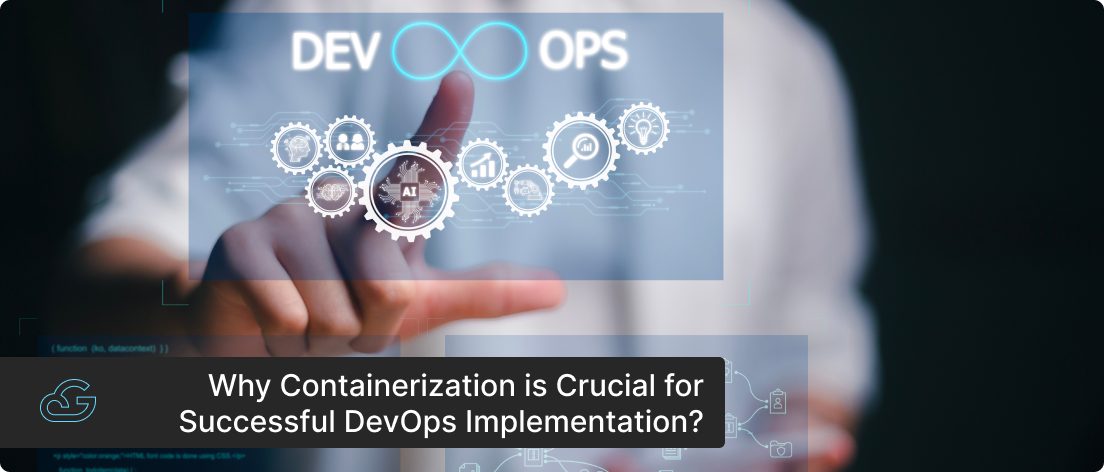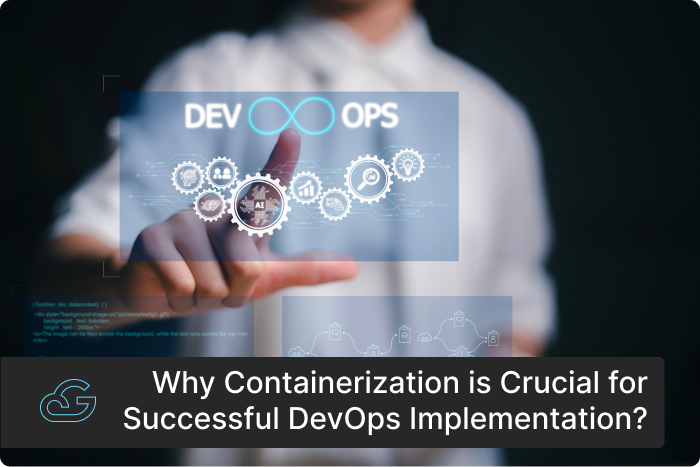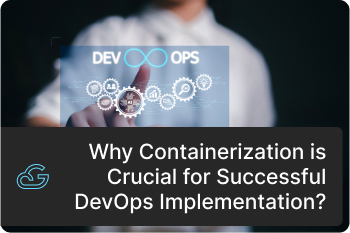Blogs / Containers
Why Containerization is Crucial for Successful DevOps Implementation?
By
Vineeth Babu
Posted: February 05, 2024
• 7 min 28 sec read
Meeting the growing demands of digital transformation has become quite challenging for today's businesses. As technology evolves, so does the need for faster, more innovative software development. It is crucial to deploy new software features quickly, but it's not that simple. There are complexities, especially related to the infrastructure, making it a tough task. This puts pressure on IT to deliver quality products quickly. To address this, companies worldwide are using DevOps practices in their software development process as it ensures a continuous development cycle without compromising on quality. To achieve this even more effectively, companies are turning to Containerization.
Modern software development extensively relies on a microservices architecture, with containers playing a crucial role in facilitating efficient construction and deployment processes. This post will help you understand the concept of containerization and how it works with DevOps to make software development collaborative and efficient.
What is Containerization?
Containerization is an approach in software development that involves compacting an application and its dependencies into a self-contained unit known as a container. It acts as a lightweight and portable application package that can run consistently across various cloud computing environments.
Using containers in cloud computing is crucial for successful DevOps implementation for the following reasons.
-
In the DevOps approach, where speed and collaboration are crucial, containerization facilitates accelerated application workflows, ensuring rapid development cycles and software delivery.
-
Cloud Containers can be quickly provisioned, deployed, and scaled based on the demands of the application or system. It allows IT teams to effortlessly build, test, and deploy pipelines.
-
Cloud Containers encourage collaboration among developers and resolve conflicts arising from different work environments, resulting in the overall success of DevOps implementation.
-
Containerization establishes a standardized environment, fostering agile deployment practices across diverse platforms. This consistency contributes to a seamless and reliable software development process within the DevOps framework.
How Does Containerization Work Using Docker?
Containerization is executed using different tools. Among these, Docker stands out as a prominent and widely used solution. Docker is a platform that helps developers easily create, deploy, and manage virtual containers for their applications. It comes with additional tools and allows developers to build and test different parts of the applications simultaneously. Each container includes everything needed to build a specific software piece. Docker also lets you move these containers to different servers or environments with ease, making it flexible and consistent for deploying software.
Here's a breakdown of how Docker performs containerization:
-
Packaging the Application
-
Utilizing the Operating System
-
Creating Docker Images
-
Resource Isolation with OS Kernel
-
Cross-Platform Compatibility
Docker initiates the containerization process by packaging the application service or function along with all the essential components—libraries, configuration files, dependencies, and parameters. This bundled unit is known as a container.
Containers leverage the operating system to condense the application and its dependencies. This technology ensures that each container shares the services of a single underlying operating system.
Docker images serve as comprehensive packages containing all the dependencies necessary to execute code within a container. This self-contained nature allows containers to easily move between different Docker environments as long as the underlying operating system remains the same.
Docker utilizes resource isolation within the operating system kernel to enable the concurrent execution of multiple containers on the same OS. This approach differs from virtual machines, which compact an entire operating system along with executable code atop a layer of abstracted hardware resources.
The final step is to ensure compatibility with different operating systems and cloud platforms. Originally designed for the Linux platform, Docker has evolved to provide robust support for non-Linux operating systems. Extensions have been made to ensure compatibility with Microsoft Windows and Apple OS X. Additionally, Docker versions tailored for cloud platforms like Amazon Web Services (AWS) and Microsoft Azure are readily available.
What Does Containerization in DevOps Mean?
Containers and DevOps often appear together in software development discussions, but why is that? It's because they complement each other perfectly, even though they're fundamentally different. Containers represent a technology, while DevOps encompasses a set of practices, cultural values, and principles. While they can operate independently, their frequent association arises from the fact that containers, as a technology, significantly facilitate the implementation of DevOps.
Let’s find out how containers and DevOps are interconnected with each other.
-
Containers facilitate agile development by ensuring a consistent and reproducible environment. It allows DevOps teams to package applications with their dependencies for consistent performance across various development stages.
-
Containerization supports automated CI/CD pipelines, enabling developers to build, test, and deploy applications consistently from development to production.
-
Containers ensure consistency across development, testing, and production environments. This fosters collaboration between development and operations teams.
-
Containers share the operating system's core (Kernel). This makes them lightweight, speeding up deployment, scaling, and how resources are used. This efficiency adds agility and responsiveness to the DevOps environment.
Why Should You Implement DevOps Containerization?
In the early days, software development, testing, deployment, and supervision followed a linear phase-by-phase approach. Each phase's completion marked the initiation of the next. However, the advent of DevOps and containerization technologies has transformed this traditional workflow. This enables software developers to smoothly integrate IT operations, share software, and collaborate, significantly boosting productivity.
Implementing DevOps with Containerization is crucial in various scenarios where efficiency, collaboration, and flexibility are vital. Here are some scenarios highlighting the importance of this combination.
-
When You Have Rapid Development and Release Cycles
If your business demands frequent updates and releases, you can greatly benefit from DevOps with Containerization as it helps to streamline the development, testing, and deployment processes.
-
When Your Applications Need to Be Built with Microservices
Architecture
In the context of Microservices Architecture, DevOps with Containerization proves imperative for the streamlined deployment and scaling of individual microservices. This dynamic combination enhances agility and modularity by condensing microservices and their dependencies within containers. As a result, the development process becomes adaptable to changing business needs.
-
When Your Organization Promotes Cross-Team Collaboration
If your organization employs cross-functional teams managing various facets of a project, leveraging DevOps with Containerization can be advantageous as it facilitates collaboration and accelerates feedback loops.
-
When a Scalable Infrastructure is Your High-Priority Requirement
When prioritizing scalability, the integration of DevOps with Containerization allows for the effortless scaling of applications. Containers can be replicated and deployed easily across diverse environments, ensuring consistent and reliable performance.
-
When Your Organization Operates in Hybrid and Multi-Cloud
Environments
In scenarios where your businesses operate in hybrid or multi-cloud environments, DevOps with Containerization provides a standardized and portable way to manage applications across diverse cloud platforms.
-
When Your Organization Needs to Align with Modern Development
Practices
If this is the scenario you are in, DevOps with Containerization provides a bridge, allowing gradual integration of DevOps principles without disrupting existing systems.
Benefits of Containerization in DevOps
In application development, containerization emerges as a game-changer, eliminating the headaches of the "it works on my machine" problem. You don’t have to juggle different environments at various stages of development, and there are no complexities of coordination among operations teams. Let's explore the many benefits that containerization offers, not just to streamline DevOps but to significantly impact the entire organization and improve end-user experiences.
-
Containerized models support single, isolated services, enabling automated testing, troubleshooting, and fixes throughout the DevOps lifecycle.
-
With intuitive tools like Docker and container registries, container technology provides a familiar and developer-friendly experience.
-
Containerization aids in addressing issues earlier in the development process, promoting "shift left security" and collaboration between DevOps and security teams (DevSecOps).
-
It supports rapid change and cost-effective adaptation through auditable and replicable processes.
How Gsoft Helps You Achieve a Successful DevOps Implementation?
Gsoft Cloud specializes in managed container services - architecting, implementing, and optimizing containerized workflows. Our expertise encompasses the entire DevOps lifecycle, with a special focus on containerization strategies that align seamlessly with your business goals. Our services include:
-
Containerization Strategy and Implementation: Create containerization strategies aligned with your business objectives and integrate them into your existing workflows.
-
Kubernetes Orchestration: Leverage Kubernetes capabilities to automate deployment, scaling, and management of containerized applications for ensuring optimal performance and resilience
-
Continuous Integration/Continuous Deployment (CI/CD): Streamline your development pipeline with automated CI/CD workflows, reducing time-to-market and enhancing overall software quality.
-
Container Security: Implement robust security measures to safeguard your containerized applications and ensure compliance to strengthen your DevOps ecosystem against potential threats.
Cloud Containers simplify DevOps implementation, and in return, DevOps maximizes the benefits of containers. At Gsoft Cloud, we seamlessly integrate Containers with DevOps perfectly to enhance your software development journey. Contact us today and let us create a tailored solution for your development success.


Get Know More About Our Services and Products
Reach to us if you have any queries on any of our products or Services.











